Can Music Improve Work Performance and Reduce Anxiety? Here’s What Research Says
Can music really make you more productive at work? Explore the science behind music and focus, discover how it impacts mood and wellbeing, and see why silence can sometimes be the best soundtrack. Plus: a hand-picked list of 34 albums for deep work and creativity.
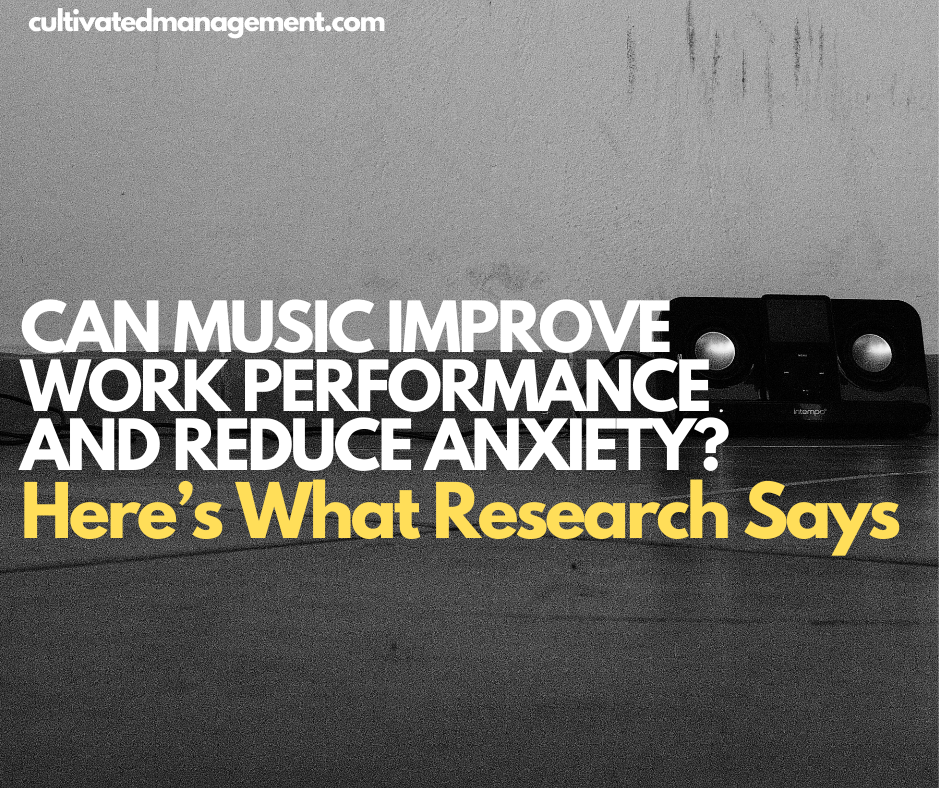
Listening to music while I work has been a life-long habit. Not during video calls or meetings, of course, but definitely when I’m doing deep work. I’ve always assumed it helped my focus (anecdotally, it does) and improved my mood. But what does the science actually say?
In this article, I’ll share a couple of personal stories, some scientific research, and my current top 34 albums (sketched into a grid — why 34? No idea, I just didn’t count properly 😀).
I’d love to hear from you too:
👉 Do you listen to music when working?
👉 Do you change it depending on the task (I do)?
👉 Or do you prefer silence? (Read on to see why silence may sometimes be the better option).
Does Music at Work Help or Hinder Performance?
As with all research, the results are mixed. Some studies show improvements, some show no difference at all. Still, there’s a lot we can learn — and test — in our own daily lives.
When we think about boosting performance and wellbeing at work, should we encourage employees to listen to music? Maybe. Maybe not.
Like many people, I use music to soothe my soul, spark creativity, and reduce stress. I use it when working out, when relaxing, and I also enjoy creating music myself.
And as you’ll see from the (slightly old-school) albums on my list, I draw from a wide range of genres — often linked to the task at hand, but sometimes just for pure listening pleasure.
Let’s dive into what the research says.
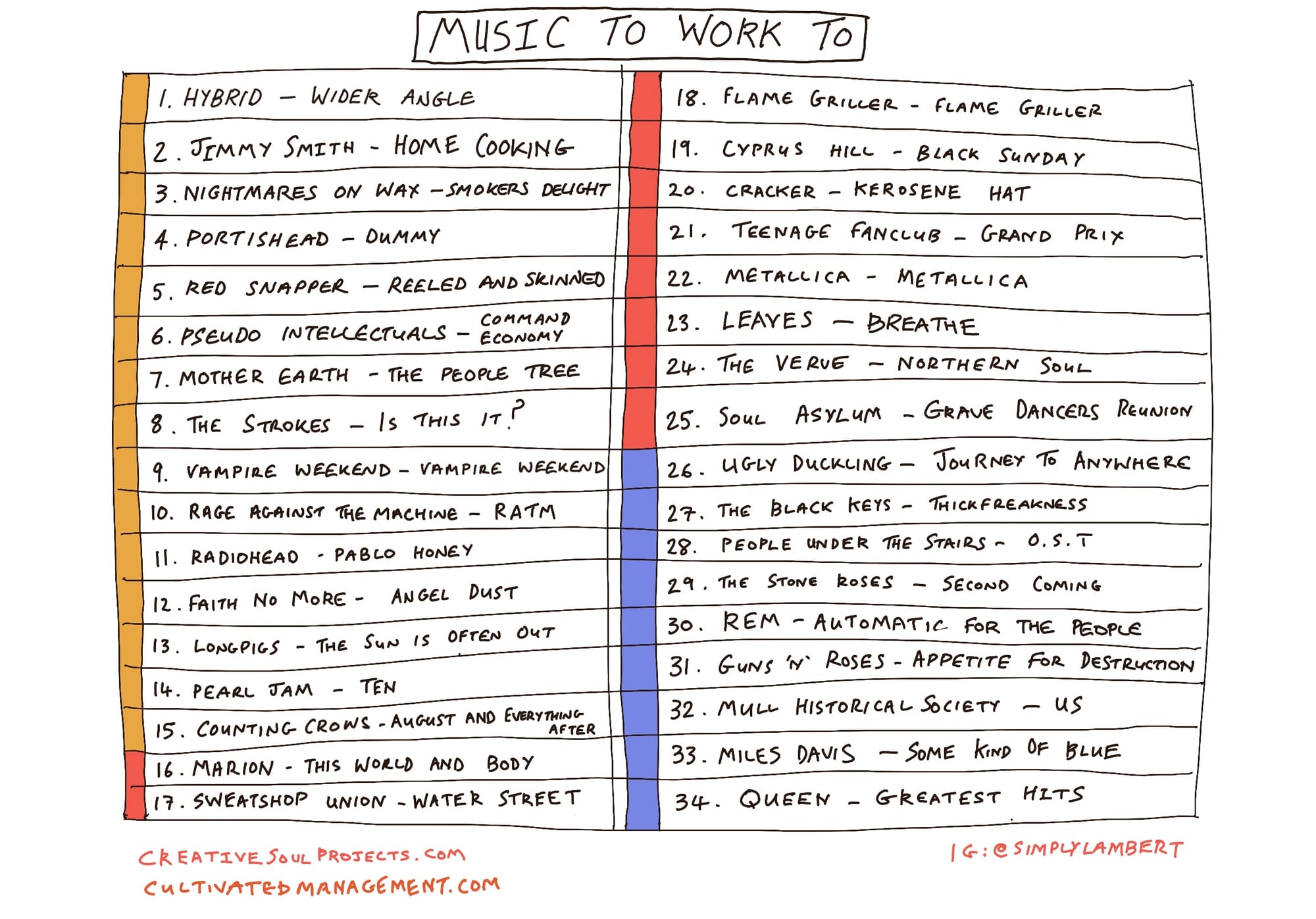
Mood, health and quality of life
Like many of you, a lot of my work is quite stressful.
Heavy workloads, family commitments, deadlines, difficult people, toxic workplaces, changing marketplace, job uncertainty, personal insecurity etc.
We live in a world where we're encouraged to grind away and be someone who changes the world. We’re bombarded with advice on how to crush our goals, outwork everyone else and be strong and confident in the process. With social media we’re exposed to other people’s amazing lives…or so they say.
Companies are often asking staff to "do more with less", and despite all of the talk about wellbeing, with well-intentioned HR initiatives, we're burning out in record numbers. (Tottle, 2016) .
We are also facing a global depression challenge. The World Health Organisation state that depression is the biggest killer on the planet. (“Depression,” n.d.).
But, could music help in alleviating some of the stress, low mood and anxiety? Could it help us to be more productive?
Low Mood and Anxiety
A really interesting piece of research (Hsu and Lai, 2004) demonstrated that patients suffering with major depressive disorder, who listened to their own choice of music for two weeks, showed significant improvements in mood (measured using Zung’s Depression Scale).
They found it was cumulative, which is to say, the more music listened to over time, the more effective it was.
Music therapy has also been shown to reduce anxiety in patients pre-operation (Trappe, 2010). The caveat here is that patients who listened to classical or meditation music saw a decrease in anxiety, yet heavy metal or techno was not only ineffective, but actually increased the risk of life-threatening arrhythmias!
Music therapy has also been shown to have a positive effect in the quality of life of the elderly when it comes to life satisfaction, music attitude and self-concept in music. (Vanderark et al., 1983).

Pain
I used to suffer terribly with migraines. Deep, dark, furious migraines that would wipe me out for days. I’ve learned what triggers them for me, so have fewer than ever, but I still get them occasionally.
When I do get a migraine I put on music, which sounds counterintuitive but seems to work. As I lay listening to music, I describe the migraine to myself, in terms of colour, size, intensity and do deep breathing to lessen the pain.

With some medication, a dark room and finding the most comfortable position for my head to rest, it seems to work. The music was a new thing - and it helped.
A meta-analysis (a review of lots of other research) found that music can help to alleviate pain in a medical setting. With a recommendation for medical staff to use music as a complementary approach to alleviate pain (Lee, 2016).
Further meta-analysis research demonstrated that any type of music genre had a positive effect on increasing Immunoglobulin A (An antibody). In other words, our immunity increases when listening to music. (Fancourt, D., Ockelford, A., Belai, A., 2014)
Performance and Productivity
A few years back I was delivering a major keynote at a conference and I was unhappy with the talk. As I paced back and forth in the hotel room the night before, I just couldn’t work out what was wrong. But I knew something didn’t quite work.
When I teach people how to present, I always say that if something doesn’t feel right about the talk, it’s not right.
I was beginning to panic. At one point I thought about going home and apologising profusely, but I was in Romania, and that created a logistical challenge I couldn’t face.
I considering going to the bar and drinking to numb the pain - but that way leads down a slippery slope.
Instead, I opened up a binaural beats app on my phone, put one some low-fi beta beats, and found a bench outside in the hotel grounds.
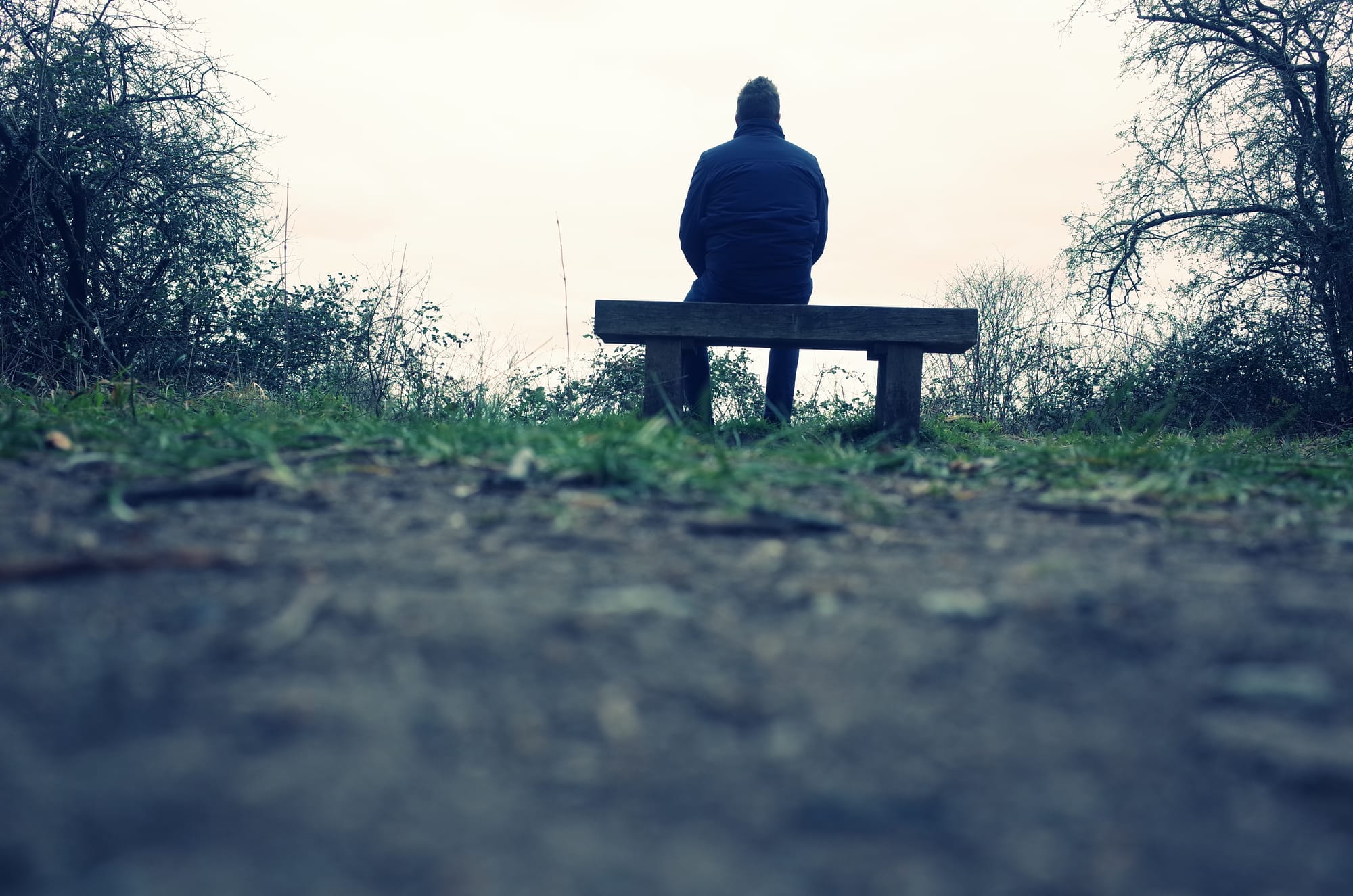
The science isn’t so strong around binaural beats (let me know if you have any scientific research on it), but it worked for me.
My sheer panic and anxiety dropped to a low level sense of irritability. I simply tuned into the environment around me, and focused on the beats in my ears.
I went back to the room, opened the talk, looked through it and asked some critical questions to get to the heart of the matter. It came to me.
I modified the slides, deleted an entire section (this was probably the main problem with the talk - I was trying to cover too many topics) and read through it several times. All the time listening to some relaxing binaural beats.
I slept ok and delivered one of the best talks I’ve ever done. I won best presentation at the conference and that talk has now been delivered all around the world.
The following year I had a similar challenge but this time I put on some old school hip hop - same effect. Music helps me relax and focus. But does it work for others?
Well, the research is mixed.
Firstly, researchers found that listening to music through headphones, whilst working does indeed boost productivity. (“Music in the Workplace Environment and Productivity - ProQuest,” n.d.).
The author’s actual recommendation, and one I whole heartedly agree with, is to simply provide a good quality pair of headphones for all employees, and encourage them, if they want to, to listen to music whilst they work.
Of course, not everyone will benefit from listening to music, which we’ll come to in a bit, but this is a low-cost option.
I worked in a company a few years back that refused to even buy each member of staff a headset with microphone to do video calls…. seriously. The staff had to buy their own gear to actually do remote calls for work.
So, as simple as providing a decent set of headphones for each member of the staff sounds, there are some companies that won’t do this.
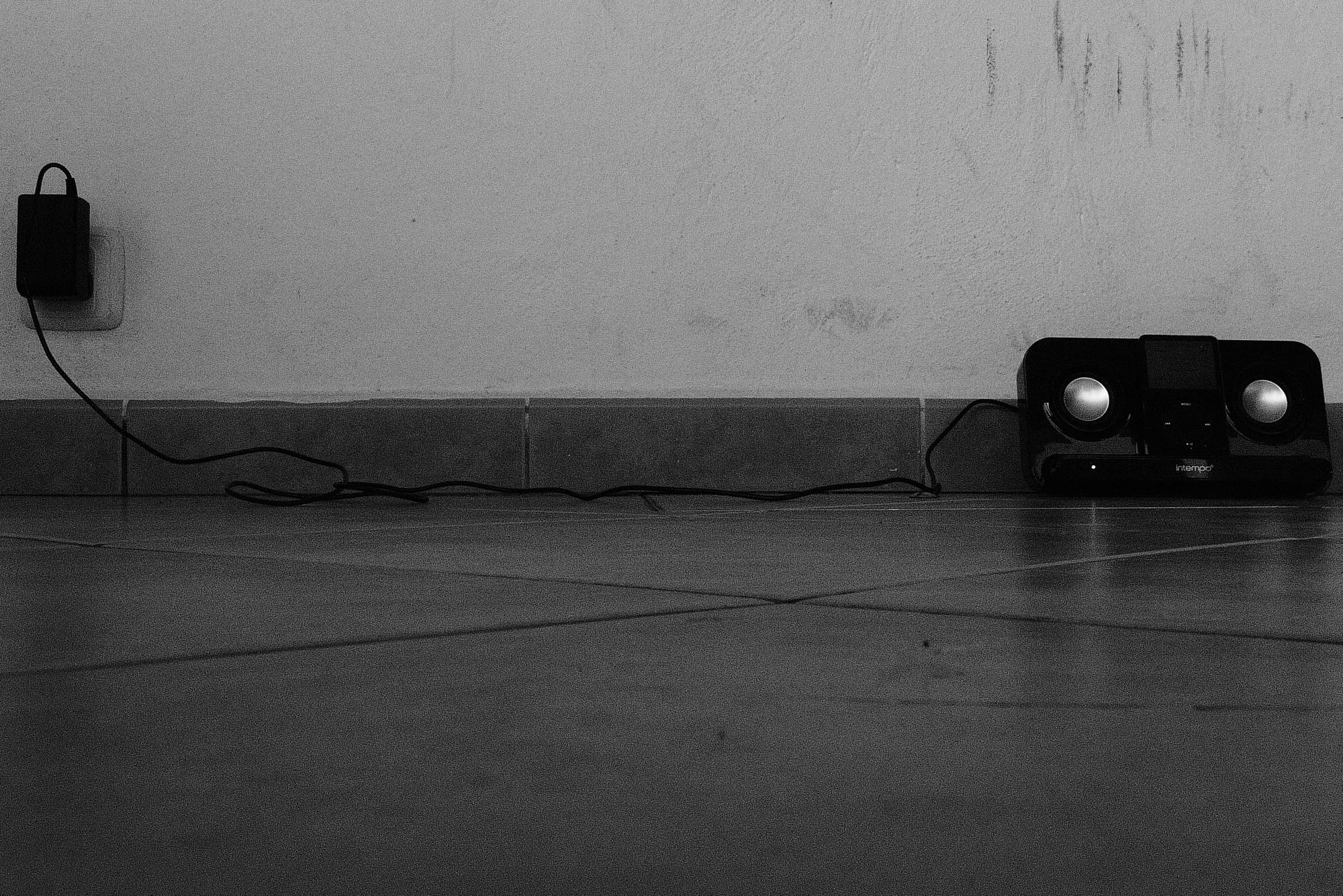
Here’s another good piece of research. I actually recommend this activity in the Communication Workshop for dealing with nerves and lifting your energy.
Research showed that employees who took a break, and did a little dance to music during that break, performed better in their role. (Hutabarat et al., 2013)
Go dance.
However, in this study, researchers found absolutely no improvement in productivity of workers in a skateboard factory when listening to music. Zero. To be fair, the employees had a favourable attitude towards the music, so you could put this one down to a positive employee engagement moment. But zero performance improvements. (Newman Jr. et al., 1966)
Maybe it's all about the dancing.

This research here demonstrated no increase in sports performance when music was present. They conclude that music is not a factor for increasing performance in runners. (Schwartz et al., 1990)
Learning and Studying
Research has shown that students who listen to music whilst studying completed tasks more quickly and generated more ideas too.
The researchers concluded that music acted as a motivator. They conclude that listening to classical, jazz, ballad and R&B were the best genre choices. (“ - ProQuest,” n.d.)
This following piece of research is interesting. It showed that rhythm, not music, was an important factor in memory recall.
In other words, when information was put into a rhythm, with or without music accompanying it, people were able to remember and recall that information better. (Purnell-Webb and Speelman, 2008)
This may explain why poems, rhyming sentences, rhythm in speech, mnemonics, verse, flowing stories etc are an effective form of communication and learning.
And this research demonstrated that children who learn to play a musical instrument have long-term enhancements in visual-spatial, verbal and mathematical performance. It’s never too late to learn an instrument! (Schlaug et al., 2005)
This research is interesting as it showed that there is a difference between introverts and extraverts in cognitive performance when music is introduced. They had 10 introverts in one group, and 10 extraverts in another. They were tasked with reading text and memorising objects. They tested with and without music.
When music was played both the introverts and extraverts had worse recall with music, than in silence, but the introverts were significantly lower indeed. This research suggests, especially for introverts, that studying in silence is a good approach. (Kahar et al., 2024)
Conclusions
The science is pretty strong towards the positive effects of music on stress, relaxation and dealing with pain.
It’s less clear cut when it comes to performance and learning, but there are some studies drawing connections between listening to music and better performance.
Equally, there are some that show no improvement at all in performance when listening to music.
It was quite frustrating researching this article. For every paper I found supporting the use of music for performance and learning, I found one that had no conclusive evidence.
But, for those that did support music being a contributing factor, it seems the genre of music matters. A number of papers cited classical, relaxed beats and "soothing" music as the main types to support productivity.
What I do
What follows is my broad approach to work and music.
I listen to music with no lyrics when I’m writing or researching. I sit in silence when deeply studying.
I listen to hip hop to feed my creativity. I listen to artist like The Leaves and Guns & Roses to elicit positive memories from the past - kind of like I’m young again!
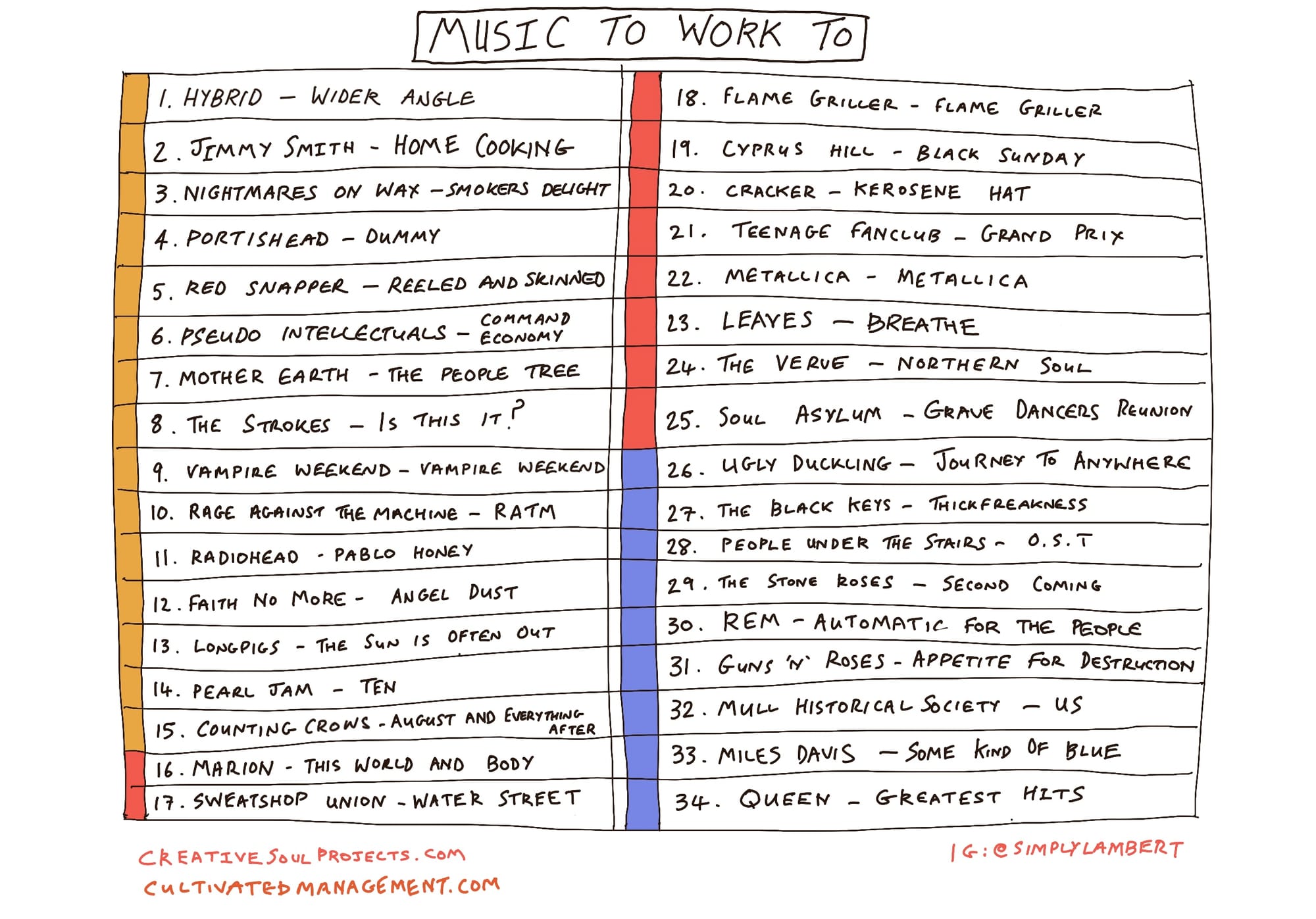
I listen to classical, jazz, funk or acid jazz when I’m creating learning notes. I love some good dance or drum & bass when I need an energy boost. I listen to rock and heavy metal when I work out. I listen to podcasts or BBC Radio 6 when I commute, or am cooking tea.
I listen to a varied mix of all genres when I want to chill out, zone out and gather some space from a digital world. And I listen to music like Nightmares on Wax, and even The Counting Crows, when I want to drift off for an afternoon nap. And I use lo-fi beats to relieve pain and enter a state of deep stress management.
Music, for me, is a door into another part of my brain. I use it to access spaces in my mind that feel closed off. And with that access comes feelings, emotions and nervous system changes, whether scientifically proven or not - they work for me.
When it comes to the workplace, there seems to be a strong case for encouraging anyone who wants to, to listen to music. It seems to be about direct music to your ears through headphones, and not a general broadcasting of tunes in the office. After all, could a team ever agree on a playlist?
When we were having our house built the builders listened to various radio stations all day - they especially liked the classic hits and quizzes. The painters listened to banging dance music. And the kitchen fitters had Virgin Radio on. Each to their own - it's what works for you.
Be careful with music if you’re studying - as per the research on introverts and extraverts.
And of course, there are plenty of other ways to deal with stress, anxiety and depression. If you need some support I’ve included some UK relevant resources below that have helped me when I needed.
And if you’re trying to improve performance there are countless ways to do this - I talk about a lot on this blog.
Finally, let me know what you listen to when you work, if you do!
Resources
If you need some help with low mood, depression and anxiety here are some resources:
👉 Mind.Org have a big list of helpful resources, support lines and advice.
👉 CALM - Campaign Against Living Miserably
👉 NHS iTalk
👉 Shout
Bibliography
[1] S. Tottle, ‘Dropping like flies: the rise of workplace burnout and how to tackle it’, The Conversation. Accessed: July 18, 2024. [Online]. Available: http://theconversation.com/dropping-like-flies-the-rise-of-workplace-burnout-and-how-to-tackle-it-67494
[2] ‘Listen while you work? Quasi-experimental relations between personal-stereo headset use and employee work responses.’. Accessed: July 18, 2024. [Online]. Available: https://psycnet.apa.org/buy/1996-93458-001
[3] J. Hutabarat, S. Soeparman, P. Pratikto, and P. B. Santoso, ‘Influence of Singing Dancing During a Rest Break Towards Productivity and Product Quality’, World Applied Sciences Journal, pp. 1239–1250, 2013, doi: 10/influent%2520singing.pdf.
[4] A. Furnham and A. Bradley, ‘Music while you work: the differential distraction of background music on the cognitive test performance of introverts and extraverts’, Applied Cognitive Psychology, vol. 11, no. 5, pp. 445–455, 1997, doi: 10.1002/(SICI)1099-0720(199710)11:5%3C445::AID-ACP472%3E3.0.CO;2-R.
[5] J. H. , ‘The Effects of Music on Pain: A Meta-Analysis’, Journal of Music Therapy, vol. 53, no. 4, pp. 430–477, Dec. 2016, doi: 10.1093/jmt/thw012.
[6] D. Fancourt, A. Ockelford, and A. Belai, ‘The psychoneuroimmunological effects of music: A systematic review and a new model’, Brain, Behavior, and Immunity, vol. 36, pp. 15–26, Feb. 2014, doi: 10.1016/j.bbi.2013.10.014.
[7] H.-J. Trappe, ‘The effects of music on the cardiovascular system and cardiovascular health’, Heart, vol. 96, no. 23, pp. 1868–1871, Dec. 2010, doi: 10.1136/hrt.2010.209858.
[8] G. Schlaug, A. Norton, K. Overy, and E. Winner, ‘Effects of Music Training on the Child’s Brain and Cognitive Development’, Annals of the New York Academy of Sciences, vol. 1060, no. 1, pp. 219–230, 2005, doi: 10.1196/annals.1360.015.
[9] S. Vanderark, I. Newman, and S. Bell, ‘The Effects of Music Participation on Quality of Life of the Elderly’, Music Therapy, vol. 3, no. 1, pp. 71–81, Jan. 1983, doi: 10.1093/mt/3.1.71.
[10] P. Purnell-Webb and C. P. Speelman, ‘Effects of Music on Memory for Text’, Percept Mot Skills, vol. 106, no. 3, pp. 927–957, June 2008, doi: 10.2466/pms.106.3.927-957.
[11] W.-C. Hsu and H.-L. Lai, ‘Effects of music on major depression in psychiatric inpatients’, Archives of Psychiatric Nursing, vol. 18, no. 5, pp. 193–199, Oct. 2004, doi: 10.1016/j.apnu.2004.07.007.
[12] S. E. Schwartz, B. Fernhall, and S. A. Plowman, ‘Effects of Music on Exercise Performance’, Journal of Cardiopulmonary Rehabilitation and Prevention, vol. 10, no. 9, p. 312, Sept. 1990.
[13] R. I. Newman Jr., D. L. Hunt, and F. Rhodes, ‘Effects of music on employee attitude and productivity in a skateboard factory’, Journal of Applied Psychology, vol. 50, no. 6, pp. 493–496, 1966, doi: 10.1037/h0024046.
[14] N. Kahar et al., ‘Perceptions of Music and its Effect on the Productivity of Students’, ASEAN Journal of Educational Research and Technology, vol. 3, no. 1, Art. no. 1, 2024.
[15] Schoenwald, Kyle ‘Music in the Workplace Environment and Productivity - ProQuest’. Accessed: July 18, 2024. [Online]. Available: https://www.proquest.com/openview/015f705e41066bc680df9aa0489e7010/1?pq-origsite=gscholar&cbl=18750&diss=y


